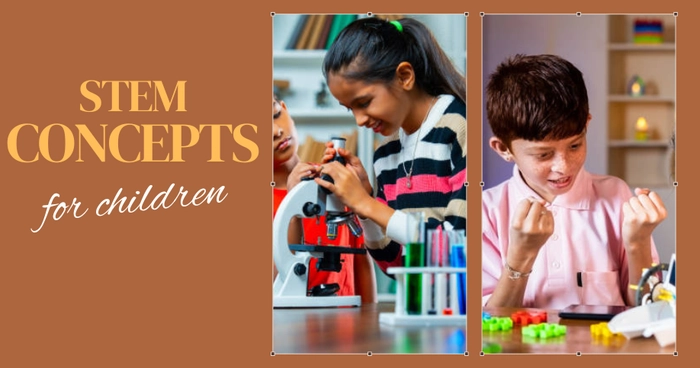STEM (Science, Technology, Engineering, and Mathematics) education is essential for preparing children for a future driven by innovation and problem-solving. However, introducing STEM concepts doesn't have to mean expensive kits or formal lessons. Indian parents can foster curiosity and learning through simple, everyday activities at home that are both fun and educational. Here’s how you can do it with a DIY approach.
1. Cooking: A Delicious Way to Learn Science and Math
Cooking is a fantastic way to teach STEM concepts while bonding with your child.
- Mathematics: Measuring ingredients introduces fractions and units of measurement.
- Science: Explain chemical reactions, like how baking soda reacts with vinegar in recipes or how heat changes the state of ingredients (e.g., melting butter or boiling water).
- DIY Idea: Make chapati dough together. Discuss ratios of flour to water, and observe how kneading changes the texture.
2. Building Simple Machines with Household Items
Introduce engineering concepts by creating simple machines like pulleys or levers using items around the house.
- DIY Project: Use a cardboard box, string, and a small bucket to create a pulley system. Let your child lift objects and explore how pulleys reduce effort.
- Learning Outcome: Discuss how these machines make work easier and where they are used in daily life (e.g., elevators, wells).
3. Gardening: A Hands-On Biology Lesson
Gardening is an excellent way to teach children about plant biology, ecosystems, and responsibility.
- Activity: Plant seeds in small pots or your backyard. Teach them about photosynthesis, the water cycle, and soil nutrients.
- DIY Experiment: Grow two plants under different conditions (one in sunlight, one in shade) and observe the differences over time.
4. Exploring Physics with Toys
Toys like cars, balls, or even paper planes can be used to explain basic physics concepts.
- DIY Activity: Build a ramp using books and a plank. Roll toy cars down the ramp and discuss speed, friction, and gravity.
- Experimentation: Change the height of the ramp to see how it affects the car’s speed.
5. Fun Chemistry Experiments
Simple chemistry experiments can be done safely at home using common kitchen items.
- DIY Idea: Mix baking soda and vinegar in a bottle to create carbon dioxide gas. Use this reaction to inflate a balloon.
- Learning Outcome: Explain chemical reactions and gases in an engaging way.
6. Coding Through Play
Coding is an essential STEM skill that can be introduced early using visual block-based platforms like Scratch or simple logic games.
- DIY Approach: Create a treasure hunt at home where your child has to follow "if-then" logic (e.g., "If you find a red object, then go to the next room").
- Technology Tip: Use free coding apps designed for kids to make learning interactive.
7. Shopping as a Math Lesson
Turn grocery shopping into an opportunity for practical math skills.
- Activity: Ask your child to estimate the total cost of selected items or calculate discounts during sales.
- Learning Outcome: Teach budgeting principles and arithmetic while involving them in real-world scenarios.
8. DIY Science Projects
Simple DIY projects spark curiosity while teaching scientific principles.
- Cloud in a Jar: Show condensation by creating a cloud using hot water, ice cubes, and hairspray in a jar.
- Magnetic Slime: Mix glue with iron oxide powder and use magnets to manipulate the slime while discussing magnetic forces.
9. Stargazing: Introducing Astronomy
Introduce your child to space science by observing the night sky.
- Activity: Identify constellations or track the moon’s phases over a month.
- DIY Idea: Create a simple pinhole projector to safely observe solar eclipses.
10. Encourage Problem-Solving Through Everyday Challenges
Everyday tasks can be turned into problem-solving exercises.
- Example: Ask your child how they would organize their toys more efficiently or fix something broken at home.
- Learning Outcome: Teach critical thinking and engineering principles through practical challenges.
Tips for Indian Parents:
- Use Local Contexts: Relate STEM concepts to things familiar in Indian households—like explaining evaporation while boiling milk or discussing gravity when water flows from a hand pump.
- Make It Fun: Turn activities into games or competitions to keep kids engaged.
- Encourage Curiosity: Allow children to ask questions and explore answers together.
- Leverage Festivals: Use events like Diwali (lighting diyas) or Holi (colors mixing) to explain scientific phenomena like combustion or solubility.
By integrating STEM into everyday activities, Indian parents can nurture their children's curiosity and critical thinking skills without needing specialized tools or resources. These hands-on experiences not only make learning enjoyable but also prepare kids for future challenges in an increasingly STEM-focused world!


